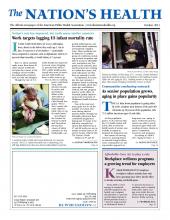People living in poverty who spend most of their time worrying about finances are left with less mental capacity to deal with other tasks, a recent study shows.
Thinking about a lack of finances led to as much as a 13 IQ point drop — equivalent to losing a full night of sleep — after low-income people were asked to think about expensive hypothetical car repairs, according to a study published in the August edition of Science.
“It’s important because it offers a new perspective on poverty,” said Jiaying Zhao, PhD, one of four study authors and an assistant professor at the University of British Columbia’s Department of Psychology and the university’s Institute for Resources, Environment and Sustainability. “We’re showing how poverty can causally impede mental function.”
The study used a series of experiments on New Jersey mall shoppers who represented a range of average annual incomes from $20,000 to $70,000. Researchers gave participants hypothetical situations about car repairs. Their options included paying for repairs at once, taking a loan or delaying repairs. Participants were either asked about expensive costs in the $1,500 range or repairs for as little as $150.
After participants were given time to think about what decision they would make, they took cognitive tests. When it came to the group presented with the expensive repair scenario, the low-income participants performed the worst on those tests compared to the higher-income participants, the study said. Both the low- and high-income participants faced with the less expensive repair scenario performed similarly on cognitive tests, the study said.
“It’s just thinking about concerns about financial issues that leads to cognitive impairment, so that itself is very powerful,” Zhao told The Nation’s Health. “You can generalize it to think about what the poor are going through every day. They’re constantly struggling to make ends meet.”
Researchers also conducted a field study on sugarcane farmers living in Tamil Nadu, India. After telling researchers they took out more loans pre-harvest and struggled with bills before harvest compared to post-harvest, farmers were given the same cognitive tests pre- and post-harvest. On average, the farmers committed a higher number of errors on the tests pre-harvest compared to post-harvest, the study said.
The study recommends that people who create policy should avoid placing “cognitive taxes” on people with lower incomes, such as having to fill out long forms. Researchers suggest providing help such as assistance with filling out forms, may make a difference, the study said.
“If you want to raise awareness for some programs or services, we should be careful about when to target these people,” Zhao said. “When they’re stressed for money or other issues, they won’t have the cognitive capacity to process more information. It may be more effective to target them when they have relatively more resources — when they get their paycheck at the beginning of the month or the end of the month.”
For more information, visit http://www.sciencemag.org/content/341/6149/976.full.
- Copyright The Nation’s Health, American Public Health Association









